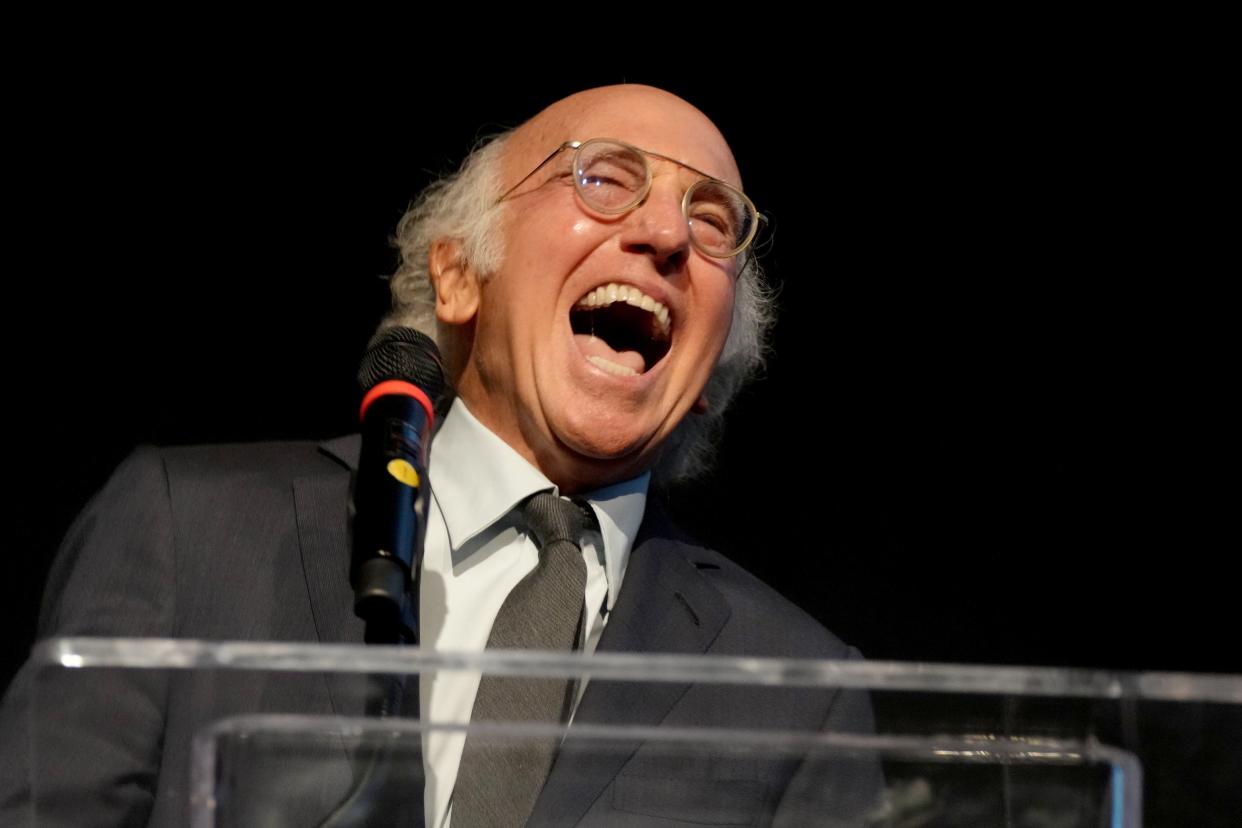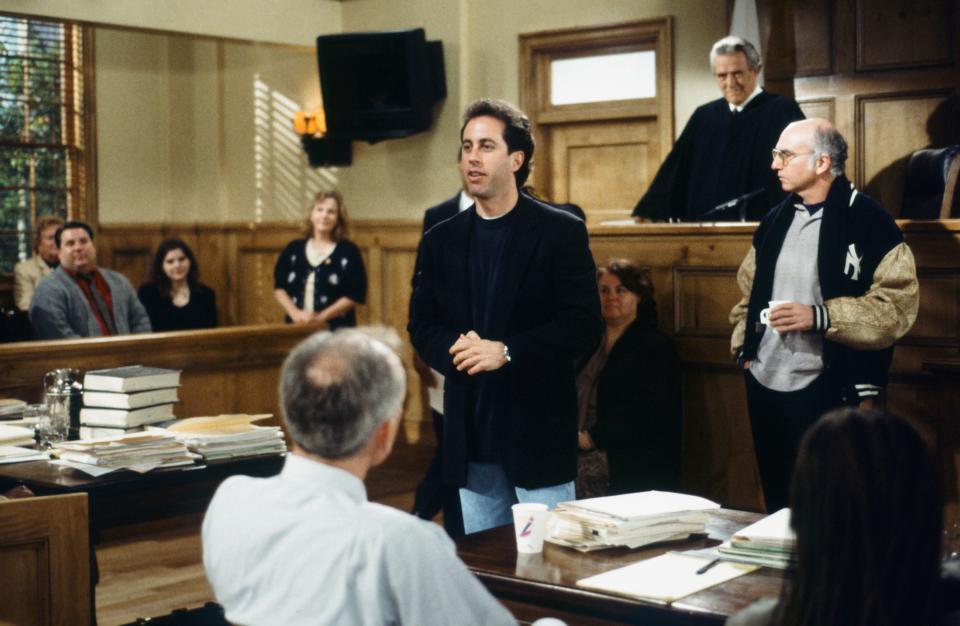Larry David Seems Pretty, Pretty, Pretty Close to Ending 'Curb Your Enthusiasm' With a Re-Do of the 'Seinfeld' Finale

- Oops!Something went wrong.Please try again later.
- Oops!Something went wrong.Please try again later.
- Oops!Something went wrong.Please try again later.
- Oops!Something went wrong.Please try again later.
Jeff Kravitz
Is Larry David headed to the pen?
We’re about a third of the way through the twelfth(!) and final (!!) season of David’s two-decade HBO cornerstone Curb Your Enthusiasm, wherein he plays a lightly fictionalized version of himself, heavy on the misanthropy. TV's “L.D.” is an increasingly unrepentant asshole, whose myopia and social bluntness often lands him into deserving hot water—there’s always an L in the wings, even when he's technically right about whatever point he's stubbornly refusing to concede. Now with the series' last run fully underway, fans are wondering if David is setting L.D. up for the ultimate comeuppance: actual jail time.
Each collection of Curb episodes from season 2 onward has followed a loose narrative arc stringing together the otherwise unrelated misdaventures of a sitcom millionaire in his twilight years— Larry tries to open a restaurant; Richard Lewis needs a kidney, etc. The lifespan of the show can be cleanly demarcated into years 1-8, when it aired relatively consistently, and 9-12, which resumed after a lengthy break in which audiences and HBO execs alike weren’t sure if David would ever actually return.
David has been ending Curb seasons with finales that could be series finales since at least season 5; that’s the year that ends with Larry dying, only to annoy the angels in heaven (played by Dustin Hoffman and Sacha Baron Cohen) so much that they send him back to Earth. But the finales that followed would’ve been just as solid to ride out on: Larry finding new family with the Blacks; Larry finally delivering a universally acclaimed Seinfeld ending and winning his wife back, only to instantly remind her why she left him in the first place; Larry and Leon hopping from coast to coast, leaving a city’s worth of aggrieved people in their wake.
Notably, Wizards-era Curb has been marked by more high-concept arcs, like Larry incurring a fatwa or being blackmailed with an obscure California residential ordinance. Season 12 is fashioning him into an unlikely liberal hero, in a thinly veiled satire of Georgia voter malpractice (a storyline that's sadly as relevant this year as it's ever been.) During a visit to Atlanta, Larry offers water to Leon's Auntie Rae as she waits in a criminally-long line outside her polling place; when he's busted for violating Georgia's (very real) Election Integrity Act, he pleads not guilty at Auntie Rae's behest, in order to call attention to the ridiculousness of the law.
Suddenly the case develops into a lightning rod, and in the span of one episode, Larry goes from inadvertent and reluctant hero to lapping up the attention, courting interview requests from MSNBC’s Willie Geist and, in an upcoming episode, more than welcoming the attention from women who love a good social justice defender.
But while Curb may have always been a space for David to flex his misanthropic id, L.D. never gets away scot free, especially in recent years. Last season, Larry's plot to outwit a blackmailer blew up in his face spectacularly, an L that led to him being trapped in a situationship with Tracey Ullman’s hilariously repugnant city councilwoman Irma Kostroski, stuck with the terrible actress Maria Sofia (Keyla Monterroso Mejia) as one of the leads on his new series, and almost drowning in a pool as a result of the very same fence law that he’d been caught violating.
It’s been reported that David briefly considered ending the show there, consigning L.D. to a watery grave. Now that he’s actually calling it quits, it’s safe to assume he won’t revisit the death well for a third time—but he could be setting L.D. up to get his just desserts with an ending that’s poetic on several layers.
Larry's election-interference case is headed for a trial that could very well end with Larry in jail, in a direct retread of the much-maligned Seinfeld finale. David left Seinfeld after the end of season 7—another nationally divisive finale, in which George's fiance dies from licking poisoned envelopes—but returned two years later to write “The Finale,” in which Jerry, George, Kramer and Elaine, stranded in a small town, are arrested for failing to help stop a carjacking. A trial ensues, during which beloved characters from the show's nine-year run take the stand to testify that these four wacky New Yorkers are actually horrible people. Eventually they're sentenced to jail; at the end, we see Jerry and George having the same meandering convos about nothing that they did in the pilot, Jerry doing standup in the prison mess hall, etc.
Larry is certainly going out of his way to keep that all-time classic divisive ending at the top of our minds: look no further than this week’s episode, where breakfast with a former Seinfeld writer (a fictional one, played by comedian Rob Riggle) and his wife leads to a direct mention of the Seinfeld finale, and its reception. David famously got to have his cake and eat it too, staging a Seinfeld revival where he got to deliver a crowd-pleasing ending—within Curb season 7. It didn’t have to face the stakes of an actual revival, but the many “Seinfeld” clips we saw within the show were actually quite funny and well-received. (George Costanza getting rich off an iPhone app only to lose his millions to his ex-wife in a divorce is just brilliant.)

Seinfeld
With that lingering demon conquered, it’s highly possible that Larry David would, 14 years removed from the Curb-Seinfeld season, decide to stand on business and say “The original Seinfeld finale was good, actually. Let’s try it again.” Notably, he has never relented on its reception—unlike his co-creator. In Curb's seventh season, Jerry argues against doing a revival because they “already screwed up one finale,” causing L.D. to indignantly argue that what they made was in fact, good.
“I think one of the things that people had a problem with is that it didn’t feel like the show, because it wasn’t small,” Jerry once said in a Seinfeld panel. “It was big, and we didn’t really do big. Small was really our instrument that we played. And that might have been why the people that were so used to the show and liked it so much felt a little, ‘This doesn’t fit in.’
It’s a fair pont. Curb started out even smaller than Seinfeld, but for better or worse, over its 24-year, 12-season lifespan, has become increasingly broad. Larry has even already done a smaller-scale version of “the trial,” using the season 9 Fatwa hearing as an excuse to trot fan-favorites out for a cameo; one doesn’t have to work hard to imagine the kind of redux the series finale would inspire, from Seinfeld cast members to Bob Odenkirk returning as Porno Gil. (This would also explain why I spotted Chris Williams, who portrayed Krazee-Eyez Killa, a one-and-done but all-time Curb character from season 3, at the season 12 premiere party.)
A show that's always deliciously toed the meta line could be in for the mother of all meta endings—and one that just genuinely fits the series, maybe even more than the original jail ending fit its parent show. Audiences in the ‘90s may not have been prepared to see their favorite quartet of self-involved yuppies taken to task for nine years of careless disregard for their fellow New Yorkers; today’s viewers, who've cringed through twenty years of L.D. at his most loathsome, may be more primed to see the book thrown at him.
It’s sad to see Larry go—for real, this time—but if he does it by pulling one last ingenious meta trick up his sleeve, that would be a Hall of Fame ending worth the whole endeavor.
Originally Appeared on GQ

